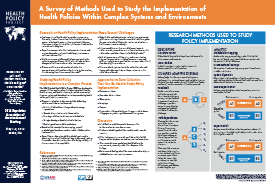The Health Policy Project ended in 2016. Work continued under Health Policy Plus (HP+) until 2022.
PUBLICATION
Author(s): Laili Irani, Matthew Hamilton, Mariela Rodriguez, and Karen Hardee
Primary Language: English
Date: 5/3/2014
Abstract:
The presence of supportive FP/RH policies is considered an integral component to successful programs. However, much remains to be known about how policies are implemented, especially in a complex political, sociocultural and economic environment. Based on a review of academic and programmatic/applied literature, this paper outlines the various methodologies that can be used to study policy implementation, which include descriptive methodologies such as literature reviews and case studies; analytic methodologies such as stakeholder mapping and analysis, cross-sectional surveys and system dynamics; quasi-experimental and experimental studies; studies describing policy implementation within complex adaptive systems, such as, path dependence; and mixed methods as well including focus groups, document analysis and interviews. This USAID- and PEPFAR-funded Health Policy Project study further highlights the challenges of using rigorous research methods to determine the link between policy implementation and health systems and outcomes. Finally, the paper recommends that further research using rigorous methodologies is needed to study policy implementation.


